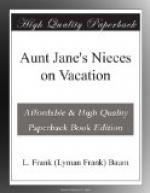“That will make it worth more, my dear,” commented Uncle John; “but frequently one must sell property for less than it’s actually worth. You must remember these people have not been used to spending much money on literature, and I imagine you’ll have to coax them to spend thirty cents a month. Many of the big New York papers are sold for a penny, and without any loss of dignity, either.”
“Do you think we can make it pay on that basis, Uncle?” asked Beth.
Uncle John coughed to gain time while he thought of a suitable reply. “That, my dear,” he informed his niece, “will depend upon how many subscribers you can get. Subscribers and advertisers are necessary to make any paper pay.”
“Advertisers!”
“Of course,” said practical Beth. “Every merchant in Millville and Huntingdon will naturally advertise in our paper, and we’ll make the major get us a lot from New York.”
“Oh,” said Patsy; “I see. So that difficulty is settled.”
Arthur smiled, but held his peace. Uncle John’s round face was growing merrier every minute.
“Patsy, do you think we shall make any money from this venture?” asked Louise.
“We ought to, if we put our hearts and souls into the thing,” was the reply. “But before we divide any profits we must pay back to Uncle John the original investment.”
“We don’t especially care to make any profit, do we?” inquired Beth. “It’s fun for us, you know, and a—a—great educational experience, and—and—a fine philanthropy—and all that. We don’t need the money, so if the paper pays a profit at a cent a copy we’d better cut down the price.”
“Don’t do that yet,” advised Uncle John, soberly. “There will be expenses that as yet you don’t suspect, and a penny for a paper is about as low as you can go.”
“What’s to be my position on the staff, Patsy?” asked Beth, turning to her cousin.
“You’re a good mathematician, Beth, so I propose you act as secretary and treasurer, and keep the books.”
“No; that’s too mechanical; no bookkeeping for me. I want something literary.”
“Then you can be sporting editor.”
“Goodness, Patsy! There will be no sporting news in Millville.”
“There will be a ball game occasionally, and I saw some of the men pitching quoits yesterday. But this is to be a newspaper reflecting the excitement of the entire world, Beth, and all the telegraphic news of a sporting character you must edit and arrange for our reading columns. Oh, yes; and you’ll take care of the religious items too. We must have a Sunday Sermon, by some famous preacher, Uncle. We’ll print that every Saturday, so those who can’t go to church may get as good a talk as if they did—and perhaps a better one.”
“That will be fine,” he agreed. “How about murders, crimes and divorces?”
“All barred. Nothing that sends a cold chill down your back will be allowed in our paper. These people are delightfully simple; we don’t want to spoil them.”




